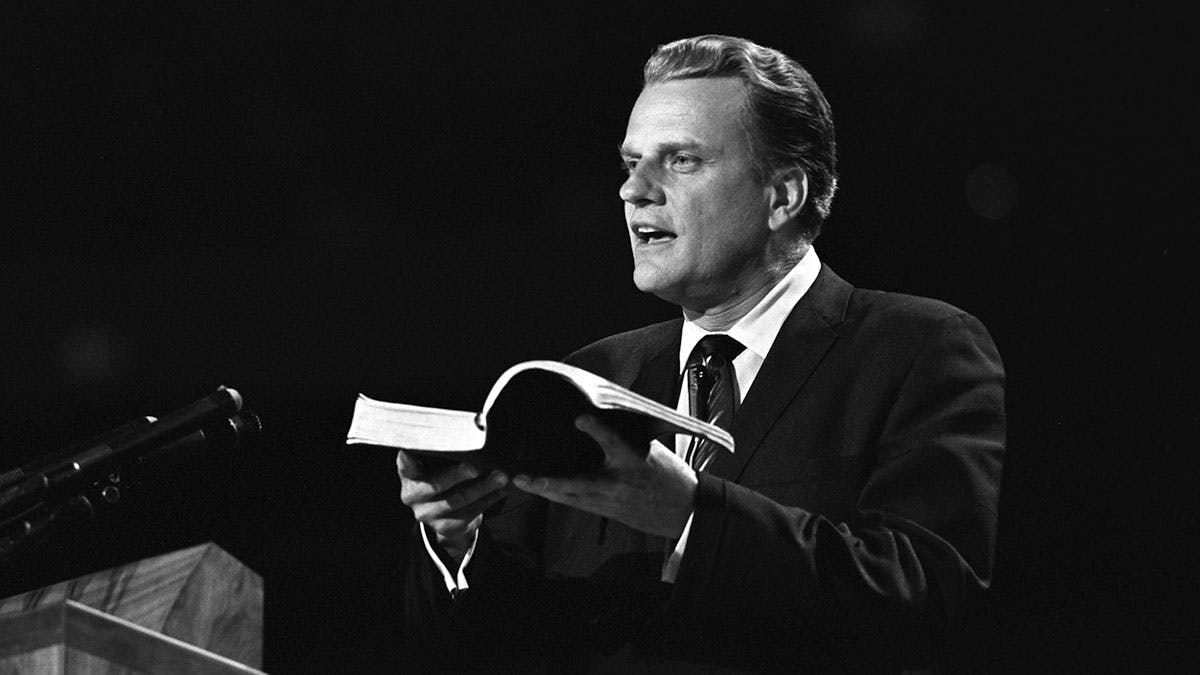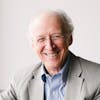2-23-19 God Did the Work,Period
‘God Did the Work, Period’
My Tribute to Billy Graham (1918–2018)

I recalled this morning (with more emotion than I expected) that one of the fears of my life as a boy growing up in Greenville, South Carolina, was that Billy Graham would die. I know there was a good deal of immature failure in that fear to trust the God who is quite able to run the world without Billy Graham. But it does give you a glimpse of the role he played as a kind of sun holding the planets in place in the solar system of my religious world in the late 1950s.
Now I am 72 in Minneapolis (remember “Box 123”?!), not a teenager in South Carolina. And Billy died today at the age of 99. This morning I have been singing his songs (“Just as I Am” and “How Great Thou Art”). The flood of emotion they awaken, after a lifetime of profound associations, is a sweet sorrow. Thank you, Lord, that you answered my boyish prayers and preserved his life as long as you did. And not just his life, but his faith and his witness.
‘I Surrender All’
Billy Graham was born on November 7, 1918, in North Carolina. In 1934, under the preaching of evangelist Mordecai Ham, Billy was converted to Christ. He attended Bob Jones University in Cleveland, Tennessee, for one year and spent three and a half years at Florida Bible Institute in Tampa. In March of 1938, he first sensed God’s calling to preach.
One night in March, 1938, Billy Graham returned from his walk and reached the 18th green immediately before the school’s front door. “The trees were loaded with Spanish moss, and in the moonlight it was like a fairyland.” He sat on the edge of the green, looking up at the moon and stars, aware of a warm breeze from the south. The tension snapped. “I remember getting on my knees and saying, ‘God, if you want me to preach, I will do it.’ Tears streamed down my cheeks as I made this great surrender to become an ambassador for Jesus Christ.” (John Pollock, Billy Graham, 17)
In the summer vacation of 1937, he had asked Emily Cavanaugh to marry him. In May of 1938, she said no.
Billy was ordained in 1939. The first time he gave his own “altar call” he was at a little church on the Gulf Coast, with 100 people present. Thirty-two young men and women came forward (Pollock, 22).
“My job is to proclaim the message. It’s the Holy Spirit’s job to do the work, period.”
In the fall of 1940, he entered Wheaton College. He met Ruth Bell in the lobby of Williston Hall — the same dormitory where my wife Noël lived as we were dating at Wheaton.
Ruth told Billy that she was unsure after all. She feared that her desire to be his wife denied a clear missionary call, unless he were bound for Tibet. “He went and prayed about the mission field, and he just had no leading whatsoever. Finally he said, ‘Well, do you think God brought us together?’ — and I had to admit I felt God had.” Billy pointed out that the husband is head of the wife: “The Lord leads me and you follow.” Ruth agreed, in faith. (Pollock, 26)
They were married August 13, 1943.
His Crisis of Faith
In August, 1949, his faith in the Bible was put to the test. It came to a climax at a student conference in the San Bernardino mountains of California. Charles Templeton had asked questions about the Bible’s truthfulness that Billy could not answer.
Billy went out in the forest and wandered up the mountain, praying as he walked, “Lord, what shall I do? What shall be the direction of my life?”
He had reached what he believed to be a crisis.
He saw that intellect alone could not resolve the question of authority. You must go beyond intellect. He thought of the faith used constantly in daily life: he did not know how a train or plane or car worked, but he rode them. . . . Was it only in things of the spirit that such faith was wrong?
“So I went back and I got my Bible, and I went out in the moonlight. And I got to a stump and put the Bible on the stump, and I knelt down, and I said, ‘Oh, God; I cannot prove certain things. I cannot answer some of the questions Chuck is raising and some of the other people are raising, but I accept this book by faith as the Word of God.’” (Pollock, 53)
That next month came the decisive turning point in Billy’s global evangelism, the Los Angeles Crusade. Overnight he became a nationally known figure. One year later, Newsweek called him “America’s greatest living evangelist” (May 1, 1950).
‘Sheer Sovereignty Chose Me’
He never lost the unshakable conviction that God had called him sovereignly to the work of evangelism and that he owed everything to God’s initiative.
“With all my heart as I look back on my life, [I believe] I was chosen to do this particular work [of evangelizing] as a man might have been chosen to go into East Harlem and work there, or to the slums of London like General Booth was. I believe that God in his sovereignty — I have no other answer for this — sheer sovereignty, chose me to do this work and prepared me in his own way.” (Christopher Catherwood,Five Evangelical Leaders, 234)
For all the technology he employed, he relied profoundly on the Holy Spirit in the work of evangelism.
He told students in 1964 at Harvard Divinity School . . . “I used to think that in evangelism I had to do it all, but now I approach evangelism with a totally different attitude. I approach it with complete relaxation. First of all, I don’t believe that any man can come to Christ unless the Holy Spirit has prepared his heart. Secondly, I don’t believe any man can come to Christ unless God drives him. My job is to proclaim the message. It’s the Holy Spirit’s job to do the work, period.” (Catherwood, 230)
When it was not yet the politically correct thing to do, he was an advocate for racial integration and respect.
In 1972, Graham accepted an invitation to speak in Durban and Johannesburg provided that the audiences were racially integrated. The South African government disliked this and only reluctantly agreed. . . . Howard Jones recalls [Martin Luther] King telling Graham, “Your crusades have done more to help race relations than anything else I know.” (Catherwood, 209)
Two Roots of His Message
He is famous for saying that he preached too much and studied too little.
One of my great regrets is that I have not studied enough. I wish I had studied more and preached less. People have pressured me into speaking to groups when I should have been studying and preparing. Donald Barnhouse said that if he knew the Lord was coming in three years, he would spend two of them studying and one preaching. I’m trying to make it up. (Christianity Today, September 23, 1977)
This is especially ironic in view of Pollock’s 1966 description of Billy’s habits of study:
Beyond all else Billy Graham studies the Bible, the supreme authority for his belief and action. Every day he reads five Psalms, covering the psalter in a month, and one chapter of Proverbs, the book that “shows us how to relate our own lives to our fellow men.” He reads through a Gospel each week, using commentaries and modern translations, and constantly returns to the Acts of the Apostles. He annotates throughout the Bible. “Sometimes His word makes such an impact on me that I have to put the Bible down and walk around for a few moments to catch my breath.” (Pollock, 248)
All of this was saturated with prayer. “I have so many decisions to make each day, and so many problems, that I have to pray all the time” (Pollock, 248).
Surely John Pollock is right that “prayer and Bible reading, inextricably intertwined, are the tap roots of Billy Graham’s character and of his message” (248).
Into Everlasting Joy
There are different ways to measure the greatness of a man’s impact. One would be the institutions that were created in the wake of his influence. Another would be the shaping power of his ideas in the culture at large. Another would be the methodological and stylistic impact of his way of doing things on the religious life of America.
“His greatest impact is the eternal difference he made in leading countless persons, from all over the world, out of destruction into everlasting joy.”
Another would be the incalculable eternal difference in being the human instrument in God’s hands, bringing hundreds of thousands of people out of darkness into light, and out of Satan’s authority into God’s family, and out of condemnation into forgiveness, and out of sin into holiness, and out of hell into everlasting joy with God. Not to mention the billions of practical effects for good in the way these people’s lives were changed in this world.
While only God can rightly assess the ripple effect of a person’s life in all the ways it has influence, my own judgment would be that Billy Graham’s greatest impact is the eternal difference he made in leading countless persons, from all over the world, out of destruction into everlasting joy and love. This was his primary mission. “Because God so loved the world, that he gave his only Son, that whoever believes in him should not perish but have eternal life” (John 3:16).

Comments